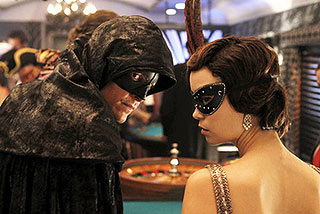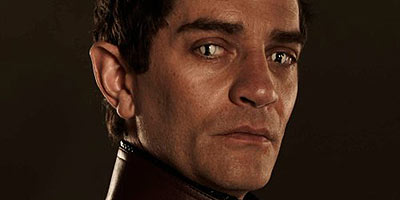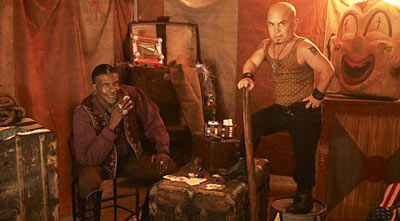The Cape: Learnin’ The Tropes
Published on January 30th, 2011 in: All You Need Is Now, Current Faves, Issues, TV |By Cait Brennan
Television has changed mightily since 2004, when a little show called Lost took to the airwaves and left behind a trail of time-traveling, Old Testament, daddy-issue, polar bear carnage. One after another, the networks have pelted home viewers with high-concept sci-fi and fantasy adventures, ranging from engaging (the unjustly canceled Invasion) to laughable (really? a reboot of V?) to just plain stultifying (The Event).

The Cape and Orwell
None of these genre efforts better typified pop culture’s creepy-uncle embrace of comic book culture than Heroes. Engaging and original in its first season, Heroes took a great cast of characters and ran them around in angel-dust spaghetti-squash circles for its last three years, finally collapsing under the weight of a mythos so impenetrable it made The X-Files look like Three’s Company. Strange and even brave, then, that NBC greenlit another big budget superhero show so soon after Heroes‘ implosion. It’s a good thing they did, because The Cape is a lot of fun—a show that both embraces and spoofs comic book tropes, with a rogue’s gallery of great characters that make it all worthwhile.
The Cape unwinds an origin story that starts out predictable but grows more clever with each passing turn. Vince Faraday (David Lyons) is the last honest cop in Palm City, a town riddled with insidious corruption. (And yes, I almost stopped watching right there.) The city’s being menaced by a masked villain called Chess, whose misdeeds include assassinating Palm City’s police chief in a spectacular televised explosion. Meanwhile, a thinly veiled Halliburton (er, excuse me, Xe) stand-in called ARK is trying to privatize Palm City’s police force, prison system, and virtually every other aspect of public life. Frustrated by his department’s incompetence, Faraday accepts a “private police” job with ARK, only to discover that its billionaire leader, Peter Fleming (True Blood‘s James Frain) is the deadly Chess. Faraday is promptly framed for Chess’s crimes, trapped in a railyard, and blown to bits under a large train. Or so it seems.
And here is the moment when it gets good. Presumed dead in the explosion, Faraday is blasted into the sewers below the city, where he is abducted by a larcenous gang of circus folk, led by master showman Max Malini (played to the absolute hilt by the excellent Keith David). Malini believes what he’s seen on the news—that Faraday is Chess—and as such, that he could help their gang to become the wealthiest banditos in the entire history of weird carnies. When Vince tells them he’s a cop, things go . . . badly. When he reveals he has a police access key to every door in Palm City, however, his fortunes—and theirs—mprove significantly. After a string of hilarious carny-worthy bank heists (including one, I kid you not, conducted by a felonious raccoon), Faraday’s earned their loyalty, and Malini agrees to give him what he wants: a chance to get revenge on Chess/Peter Fleming, and get his life back.

Chess
Vince has no actual superpowers, so we’re spared all the ponderous meditations on “specialness” that mired Heroes and Lost. Malini is a ruthless and audacious master of illusion (the character’s assumed name is no accident), and trains Faraday in a wide range of special skills and sideshow trickery, everything from disappearing acts to mentalism, from knife catching to . . . um, ultimate dwarf combat. Finally, Malini gives Faraday a cape with unusual properties, formerly owned by a mad illusionist—a costume that looks eerily similar to his son’s favorite comic book hero, The Cape. Faraday assumes the comic hero’s identity in order to send a message to his son, that one man . . . can make a difference. Yes, he actually says it.
With those well-worn tropes, The Cape could be tedious, but it succeeds because it doesn’t try to reinvent the genre. Instead, it revisits those touchstone moments with affection and humor, gently spoofing the pillars of the genre while embracing them. (Those who encounter The Cape invariably find the name ridiculous. “Well, you’ll work on it,” says a shopkeeper.) In some ways it recalls the 1966-68 Batman series. While The Cape is nowhere near as campy and over-the-top preposterous, it shares a winking embrace of pulp comic-book staples. And The Cape’s villain-of-the-week format recalls some of the finest scenery-chewing moments of Adam West’s numerous nemeses.
With all respect to David Lyons and Summer Glau (who plays Orwell, an “investigative blogger” who might as well be credited as “D. X. Machina”), the show’s most dynamic moments come from the supporting players. Keith David is electric as Malini, and James Frain’s take on the classic mad British villain conveys both genuine menace and an unhinged glee that’s impossible to resist. The “specialty” villains in particular are spectacular. There’s Gregor The Great, the mystical cape’s disgruntled previous owner, who kills people with well-flung playing cards; Cain, a greasy Hell’s Kitchen-style master chef whose poison-laced recipes are murder (sorry, couldn’t help myself); and best of all, Scales, the green flaky Cockney tough who gives new meaning to the heartbreak of psoriasis (and who will no doubt remind Mighty Boosh fans of a certain green Cockney hitcher). Future villains include Dice, Goggles, and The Lich, leading one to suspect the Cape’s ultimate enemy may be the Gygax.

Malini and Rollo
Malini’s circus crime gang (especially Rollo, the brawling, lustful Little Person played with zeal by Martin Klebba) is perhaps the single best element of the show, and balances out Our Hero’s most serious, pendulous lines. If that sounds like a slam on the Cape himself, it’s not. The Cape works best when all its elements—its earnest love of classic superhero archetypes and its Statler-and-Waldorf ribbing of those tropes—come together at once.
It’s also hard to resist the eye-popping art direction/design. Palm City is richly realized, from the undecayed Gotham of the city center to the warm, sumptuous colors and exceptional detail of the circus environment. Chess’s “look” (including a great steampunk-influenced mask and outfit) adds greatly to his menace, and his coolness.
The Cape‘s ratings have inspired dozens of hack headline writers to use the phrase “less than super.” Trounced by CBS’s comedy lineup and ABC’s The Bachelor, it’s going to be a challenge for the show to survive. But it’s a lot of fun, and it deserves a chance to find an audience. Here’s hoping that’s a trick The Cape can master.
Time limit is exhausted. Please reload the CAPTCHA.